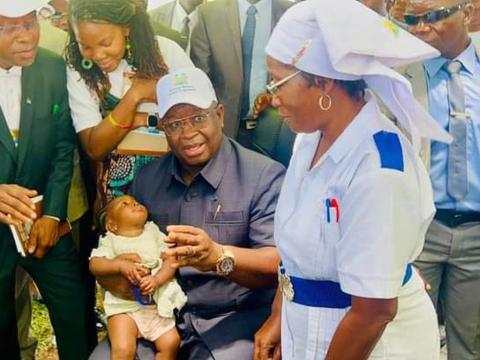By Sorie Ibrahim Fofanah
Sierra Leone on Thursday 25th April observed World Malaria Day which also saw the roll-out of the National Malaria Vaccine campaign at State House in Freetown.
The nationwide malaria campaign will see the distribution of nearly 5.4 million special Insecticide-Treated Nets (ITNs) using a digitized registration system. With $5.3 million from the Global Fund, UNICEF, WHO, and other partners are supporting the Ministry of Health in this effort.
At the event President Julius Maada Bio said: “Malaria remains the leading cause of morbidity and mortality in Sierra Leone, accounting for 40.3% of outpatient attendance for all ages and 37.6% of hospitalized cases’’.
He explained how malaria has had an excruciating pain on Sierra Leoneans with too many families having experienced the anguish of watching their children suffer from a preventable and treatable disease. ‘’But today, we turn a new page in our fight against malaria. With these vaccines for our children under two years old, we embark on a journey of hope and progress,” President Bio said.
He noted that Sierra Leone is among countries with the highest malaria burden globally, with over two million hospital visits annually attributed to the disease, half of whom are children under the age of five. Malaria also accounts for 25% of all child deaths in the country, the president stated.
United States Ambassador to Sierra Leone, Bryan Hunt who was also present at State House expressed his government’s desire to support the zero malaria campaign in the country.
According to the US Ambassador, the launch of the malaria vaccine in Sierra Leone has the potential to save the lives of hundreds of thousands of Sierra Leonean children, saying with over two million cases every year, malaria remains ever present as a significant health threat in Sierra Leone. “It also remains one of the most preventable causes of adverse birth outcomes and the leading cause of death among children. The malaria vaccine that we are rolling out today has the potential to change that trajectory and protect Sierra Leone’s children from the most severe and deadly effects of this disease,” Hunt said, noting the two countries’ continued partnership to protect people from malaria and support healthy communities.
He acknowledged their joint work to ensure timely and universal distribution of malaria tests, medicines, and insecticide- treated nets saves lives. “Since 2017, the United States government has contributed $108 million to these prevention, diagnostic, and treatment tools. If used correctly by health care providers and communities, these joint interventions help protect those at greatest risk from the disease -- pregnant women and children,” he said.
“Without an effective partnership to end malaria we could not have made such impressive progress, and I want to thank the Ministry of Health for its leading role in helping achieve these amazing results,” the Ambassador noted, saying more needs to be done to ensure malaria is eliminated from Sierra Leone.
He further stated that their current interventions like bed nets and fast acting anti-malaria medicines needed to be reinforced, and that “innovative” intervention like the malaria vaccine can sustain and accelerate progress.
He said children in Africa are for the first time beginning to receive the world’s first malaria vaccines as part of routine childhood immunization, and that “with the launch of the malaria vaccine today, Sierra Leone joins five other African countries in investing in the protection of its children through routine introduction of this malaria vaccine.”
The U.S. Government delivered over 4.1 million bed nets, 4.3 fast-acting medicines and 4.3 million testing equipment. According to them, more than 25,000 health care providers have been trained to detect and treat malaria cases, with over 1.5 million people protected through spraying of their homes with insecticides, whilst prevalence amongst children dropped from 40% in 2016 to 22% in 2021.
Health Minister Dr. Austin Demby pointed out that “with the new, safe, and efficacious malaria vaccine, we now have an additional tool to fight this disease. In combination with insecticide-treated nets, effective diagnosis and treatment, and indoor spraying, no child should die from malaria infection”.
UNICEF Representative Liv Elin Indreitin in her statement said the launch of the malaria vaccine into the routine immunization service marks a laudable venture, ensuring that every child between the ages of 6 to 23 months has access to this life-saving intervention. “This initiative not only underscores our commitment to achieving universal health coverage but also reflects our resolve to leave no child behind’’, she said. She described the event as ‘’a pivotal moment in our journey towards a malaria-free Sierra Leone complementing existing interventions such as insecticide-treated bed nets, indoor residual spraying, and prompt diagnosis and treatment”.
It’s being reported that through the Accelerated Malaria Vaccine Introduction and Roll-out in Africa (AMVIRA) initiative, WHO also supported the development of a dashboard to track readiness assessment, vaccine supply and vaccination roll-out at the national and district levels, a tool that is expected to be an asset in generating and sharing key data to better understand vaccine uptake and delivery.
Copyright © 2024 Politico (26/04/24)








